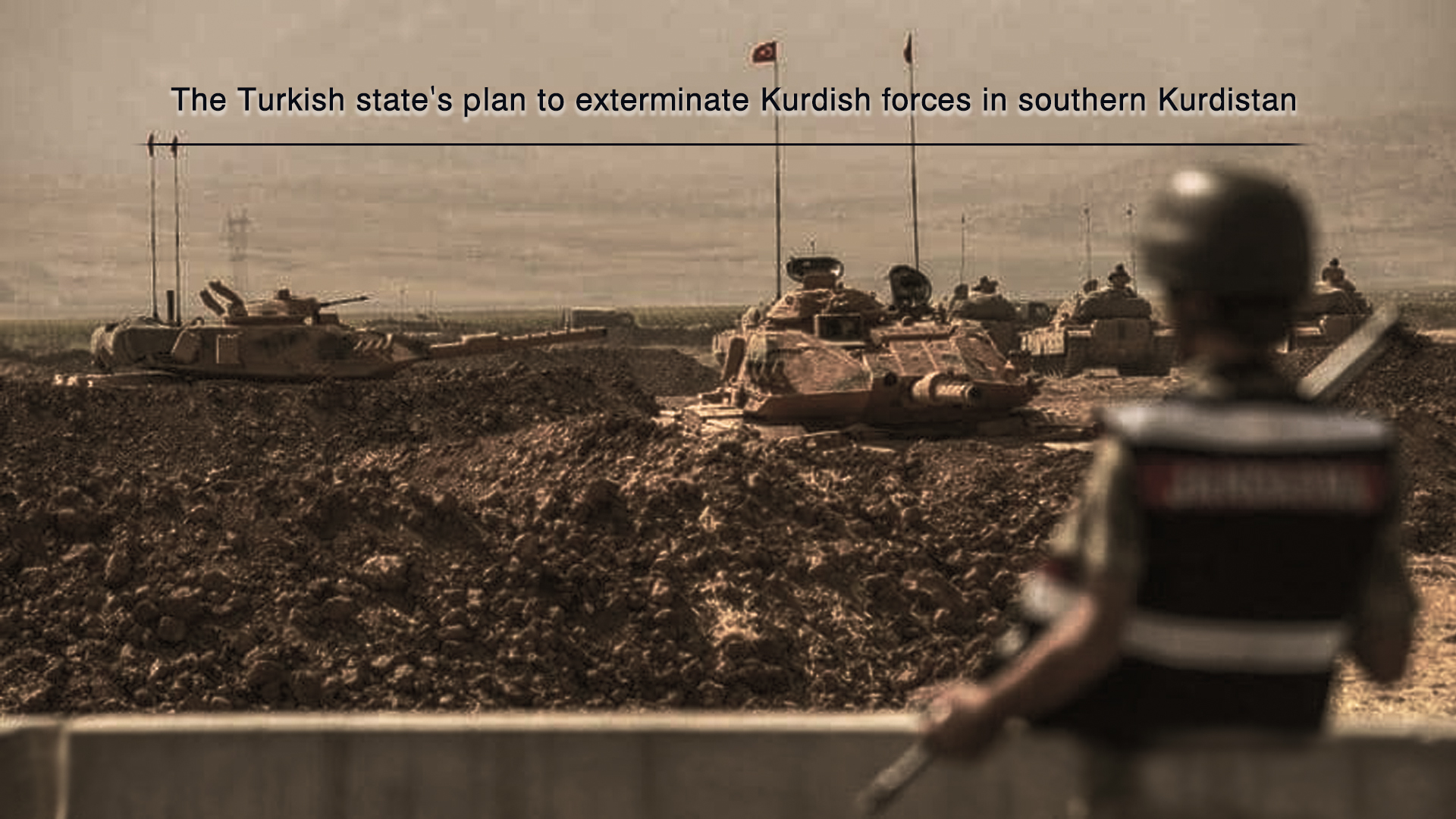The Turkish state’s plan to exterminate Kurdish forces in southern Kurdistan

The Turkish state has sought, since the beginning of this year, to increase its presence on the territory of the Kurdistan Democratic Party (KDP) in northern Iraq, whether through launching military operations that started on April 23 or through strengthening military bases within the territory of the region, which reached nearly 38 military bases distributed over the entire border strip, extending from the Iranian borders reaching the triangle of borders of Syria, Iraq and Turkey, in a way that raises the question about the Kurdistan Region Government (KRG) tolerance of the Turkish tide that exceeded the sovereignty of Iraq and the KRG.
Undoubtedly, the recent parliamentary elections in Iraq and the KDP’s acquisition of 34 seats revealed somewhat the dispelling of the concerns that the KDP had in the possibility of controlling the political reality in southern Kurdistan and overthrowing the political parties and forces with which it shares the revenues of southern Kurdistan as well as its participation in making the decision. Perhaps these steps did not come individually, but came with the support of the Turkish state, which shares the goals with the KDP, which is to extend over the entire geography of southern Kurdistan (northern Iraq).
The KDP shares the policies carried out by the Turkish state towards the Kurdish people in the four parts of Kurdistan, through its implementation of policies targeting the Kurdish people in three main axes, which is the implementation of the Sinjar (Shingal) Agreement and paving the way for the arrival of Turkish forces to the vicinity of Sinjar and besieging it, and their return to the disputed areas, the most prominent of which is Kirkuk, which is one of the main goals that the state, through the Turkmen card, seeks to reach, in addition to supporting the military operations carried out by the Turkish state in Qandil. Of course, these policies pursued by the KDP constitute a kind of pressure to obstruct the solution of the Kurdish issue in the region.
In a related context the KDP is involved in the internal disputes that had recently engulfed the ranks of the Patriotic Union of Kurdistan (YNK), which ultimately led to the exclusion of Lahore Sheikh Jangi, one the YNK prominent leaders, in addition to the issue of the attempted poisoning of Mullah Bakhtiar, one of the prominent leaders of the YNK, who had previously stated his disappointment because some Kurdish leaders were behind the attempts to poison him; Thus, one of the most prominent Kurdish political forces in southern Kurdistan is preoccupied with its internal affairs, ignoring the efforts of the KDP to reach the presidency as well, in addition to its control of the majority in the Iraqi parliament.
These data come in parallel with the Turkish expansion and the imminence of the Turkish state’s construction of a military base in Sulaymaniyah, which is under the influence of the YNK. Of course, the political confusion within the Kurdish forces in southern Kurdistan enhances the position of the KDP to expand. Here, we emphasize that the expansion of the KDP means the expansion of Turkish state influence.
On the other hand, the recent understandings between Baghdad and the Kurdish forces regarding the return of the Peshmerga to the disputed areas brought a kind of hope to the Kurdish forces for the return of Kirkuk. However, representatives and delegates of the elections from the Kurdish forces were prevented and harassed by the Turkmen component in Kirkuk amid the escalation of voices demanding the rights of the Turkmen component. Here, it can be noted that the Kurdish forces will not be able to enter Kirkuk unless there are understandings between them and the Turkish state. Of course, these understandings are limited to the latter and the KDP, so the only forces capable of entering Kirkuk are the KDP.
These moves by the KDP were accompanied by the insane intensification of the Turkish state’s military operations in southern Kurdistan, in addition to the intensification of its overflights to accompany the ground operations of the Turkish soldiers with combing operations by the Peshmerga, part of which had cost the protection of military bases and led to a change in the tactics of war against the PKK fighters and their exploitation and the PKK’s failure to engage in the conflict with the Kurdish forces, which allowed the KDP to expand further in the geography of southern Kurdistan; In addition, the recent attacks on Erbil and the vicinity of US military bases led by the Turkmen movement within the Popular Mobilization confirm the crystallization of the basic idea, which is to keep southern Kurdistan in a state of instability and direct the attention of the Kurdish forces to the outside and not look at the changes in the political reality and military in Southern Kurdistan.
Alan Daoud




